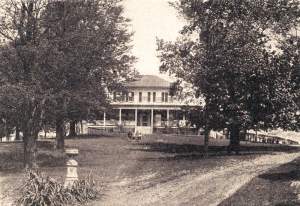Record Data
Source citation
Cornelia Peake McDonald, A Woman's Civil War: A Diary, with Reminiscences of the War, from March 1862, ed. Minrose C. Gwin (New York: Gramercy Books, 2003), 147-149.
Type
Diary
Date Certainty
Exact
Transcriber
Transcription adapted from A Woman's Civil War: A Diary, with Reminiscences of the War, from March 1862 (2003), edited by Minrose C. Gwin
Adapted by Don Sailer, Dickinson College
Transcription date
Transcription
The following transcript has been adapted from A Woman's Civil War: A Diary, with Reminiscences of the War, from March 1862 (2003).
[May] 15th - The shadows are darkening around us in the devoted town. Jackson is certainly dead. There is no longer room to doubt it. To say that it is a personal calamity to each and every individual is to say little. “The Mighty has fallen,” but he carries to his grave the hopes, and is followed by the bitter tears of the people in whose defense he lost his life, and who loved him with grateful devotion. No loss could be felt as his will be. In every great battle fought in Virginia he has been a leader, and has never known defeat. Success crowned his every effort. Especially was Winchester the object of his care and solicitude. Last spring when he was driving Banks out, as he rode through the town, the people poured out of their houses giving vent to their joy and exultation, he was heard to say, “A noble old town. It and its people are worth fighting for.”
Even the Yankee papers accord to him the praise that was justly his. One, the New York Tribune, the greatest enemy the South has, speaks of him as “A great General, a brave soldier, a pure man, and a true Christian,” but adds that they are glad to be rid in any way of so terrible a foe. He needs not their praise to add to the lustre of his great name. His place will be forever in the hearts of the Southern people. Not only the Hero’s laurels bind his brow, but a crown incorruptible has been placed on it by the great Captain whose he was and whom he served. The people in town feel very despondent about being relieved from their bondage now that the Champion of the Valley is no more.
Well may they sigh for relief, for the tyrant’s hand becomes every day heavier; besides there are indications, it is said, of a dreadful disease breaking out in the camps. Eight hundred of the soldiers are sick in the town, besides many dying, and in town there is scarcely a house where there is not sickness, mostly of young persons. ….
Last night I left this book in which I am writing lying on a table and went down stairs. Nell spied two officers approaching the house, and supposing they were coming for a search, first concealed the book and then went to see what they wanted. Great prudence on the part of a maiden of seven years. I might not have taken such a precaution myself. I asked her why she did it, and she said she thought there might be something in it the Yankees ought not to see. I had not thought of her knowing the character of the book…
Even the Yankee papers accord to him the praise that was justly his. One, the New York Tribune, the greatest enemy the South has, speaks of him as “A great General, a brave soldier, a pure man, and a true Christian,” but adds that they are glad to be rid in any way of so terrible a foe. He needs not their praise to add to the lustre of his great name. His place will be forever in the hearts of the Southern people. Not only the Hero’s laurels bind his brow, but a crown incorruptible has been placed on it by the great Captain whose he was and whom he served. The people in town feel very despondent about being relieved from their bondage now that the Champion of the Valley is no more.
Well may they sigh for relief, for the tyrant’s hand becomes every day heavier; besides there are indications, it is said, of a dreadful disease breaking out in the camps. Eight hundred of the soldiers are sick in the town, besides many dying, and in town there is scarcely a house where there is not sickness, mostly of young persons. ….
Last night I left this book in which I am writing lying on a table and went down stairs. Nell spied two officers approaching the house, and supposing they were coming for a search, first concealed the book and then went to see what they wanted. Great prudence on the part of a maiden of seven years. I might not have taken such a precaution myself. I asked her why she did it, and she said she thought there might be something in it the Yankees ought not to see. I had not thought of her knowing the character of the book…





